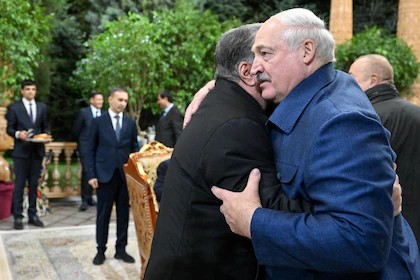Moscow demands Ukrainian troop withdrawal from annexed regions; both sides consider a 1,000-prisoner exchange and a potential Putin–Zelensky summit.

After an hour and 45 minutes, the delegations of Ukraine and Russia concluded their first direct meeting since 2022, aiming to find a negotiated solution to the war triggered by Russia’s invasion, according to the pro-government Turkish agency Anadolu reporting from Istanbul.
The agency noted that the meeting, mediated by Turkish Foreign Minister Hakan Fidan, lasted less than two hours. Suspilne, Ukraine’s public broadcaster, referred to it as a “pause” in the talks. It remains unclear whether another round will follow.
During the session, Russia demanded that Ukraine withdraw its troops from the four Ukrainian regions that Moscow annexed during the invasion, a condition Kyiv firmly rejects. This demand was originally made by Moscow in June.
Additionally, both sides opened the door to a potential exchange of 1,000 prisoners from each side. Russia also announced that it would review proposals for a ceasefire and a potential summit between Presidents Putin and Zelensky.
Official Positions of Both Countries
Territories for Moscow
Since launching the invasion in February 2022, Russian President Vladimir Putin has maintained maximalist demands. He insists that any resolution process must address the “root causes” of the conflict, beginning with Ukraine’s aspiration to join NATO—a move Moscow sees as an existential threat.
Russia also demands the recognition of its annexation of four partially controlled regions in southern and eastern Ukraine—Donetsk, Luhansk, Kherson, and Zaporizhzhia—as well as Crimea, annexed in 2014.
In late March, Russian Foreign Minister Sergey Lavrov stated that international recognition of these territories as part of Russia is “imperative” for any conflict resolution.
Putin has cited several justifications for the offensive launched in 2022, including the “protection” of Russian-speaking populations in eastern Ukraine and the “denazification” of a country he claims is under the control of Western powers hostile to Russia.
Moscow also calls for an end to Western arms shipments to Ukraine and the dismantling of ultranationalist Ukrainian groups.
In March, Putin even suggested a “transitional administration” in Ukraine under UN supervision, which would entail the removal of President Volodymyr Zelensky.
Putin does not recognize Zelensky’s legitimacy, arguing that his five-year mandate expired in May 2024, though elections have been impossible due to the war.
He also maintains that the 2014 Maidan revolution, which brought pro-Western leaders to power, was a “coup” against the then pro-Russian president.
“Security Guarantees” for Kyiv
In Ukraine, the topic of territorial concessions remains deeply painful. Since 2014, the country has endured enormous human sacrifices and economic hardship to preserve the borders inherited from the dissolution of the USSR in 1991.
Zelensky has mentioned possible territorial “exchanges” with Moscow related to areas controlled by Kyiv in Russia’s Kursk region, though Ukrainian forces were expelled from that area by Russia in late April.
It remains to be seen what concessions, if any, could be reached between Kyiv and Moscow, as Ukraine continues to demand a full withdrawal of Russian troops from its territory.
A particularly sensitive issue is Crimea. Zelensky publicly maintains that Kyiv will not give up the peninsula, which has a Russian-speaking majority and was annexed by Moscow in 2014, as Ukraine’s Constitution clearly establishes it as national territory.
Zelensky is calling on his allies to provide “security guarantees” to Ukraine to deter Russia from launching another invasion after any potential peace agreement.
In this context, Kyiv’s primary demand is to join NATO—an option categorically rejected by Moscow and also dismissed by U.S. President Donald Trump.
As an alternative, Ukraine is discussing with European partners the creation of a Western military contingent that could be deployed in the country with NATO support if peace is achieved. This option has also been firmly rejected by Moscow.
Ceasefire
To begin a diplomatic resolution process, Kyiv—along with the Trump administration—has been calling for an “unconditional” 30-day ceasefire as a precondition to talks.
Its European allies, in coordination with the United States, issued an ultimatum to Russia last weekend: accept a truce to negotiate or face “massive” sanctions in response.
So far, Putin has rejected Kyiv’s and its allies’ ceasefire demands, arguing that such a truce would merely allow Ukrainian forces—struggling at the front—to rearm with Western help.
However, in response to this European and Ukrainian pressure, the Russian president proposed holding direct talks between Russian and Ukrainian delegations in Istanbul on Thursday to discuss the outcome of the conflict.
This is the first time since the spring of 2022 that negotiations have resumed, after initial efforts in Belarus and Turkey failed to halt the fighting.
Exchange of 1,000 Prisoners per Side
During the meeting held this Friday in Istanbul, the Russian and Ukrainian negotiating teams agreed to the possibility of exchanging 1,000 prisoners of war from each side as soon as possible.
The announcement was made by Ukrainian Defense Minister Rustem Umerov, who heads the Ukrainian delegation.
Over the course of the more than three-year war, several prisoner exchanges have taken place.
A Summit Between Putin and Zelensky?
Russian chief negotiator Vladimir Medinski, in a press appearance broadcast live on television from Istanbul, said he had “taken note of the proposal.”
“The Ukrainian side requested direct negotiations between the heads of state. We have taken note of that proposal,” said the Kremlin advisor.
He also expressed that he was “satisfied with today’s results” and “willing to continue contacts.”
Keep Independent Journalism Alive
In a world flooded with noise, independent journalism is more vital than ever. We work hard to bring you clear, accurate, and unbiased international news — free from corporate or political influence.If you believe in the power of honest reporting, please consider making a donation. Every contribution, big or small, helps us stay independent and keep the world informed.
Support us via PayPalYour support makes a difference.


